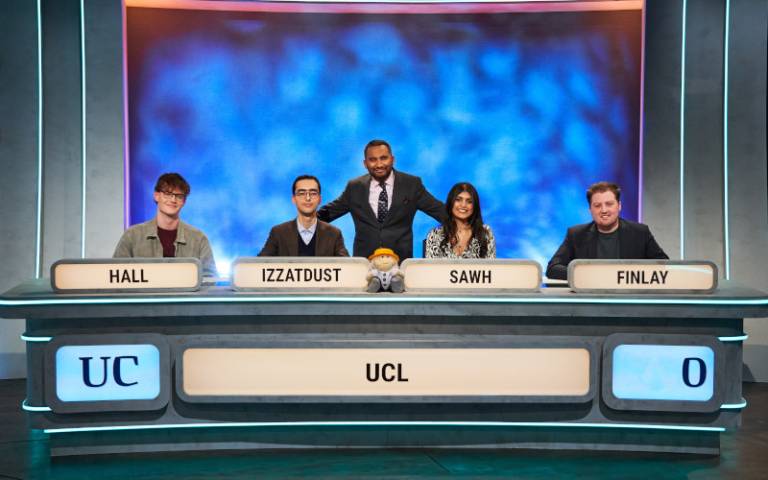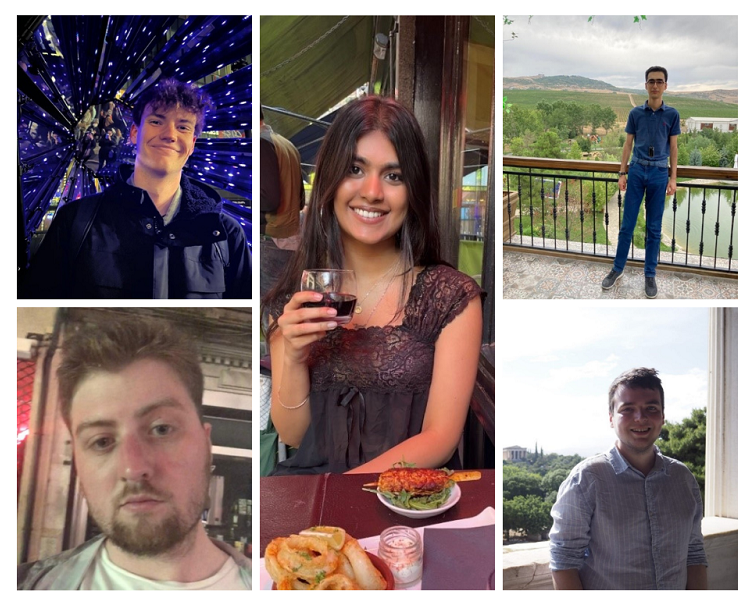Introducing the 2023 UCL University Challenge Team
26 May 2023
UCL has competed in University Challenge since the show’s debut in 1962. We speak to next season’s team, who will compete in the first series without the inimitable Jeremy Paxman. We discussed the journey from viewing to competing, the pressures of selection, and preparation.

UCL's 2023 University Challenge Team. From left to right (front row); James Hall, Ali Izzatdust, Tayana Sawh, Jacob Finlay)
University Challenge has been a staple of British television for over sixty years. Known for its often-bewildering questions, as well as its presenters’ catchphrases – fingers on buzzers, please – to this day, it attracts a couple of million viewers to its Monday evening slot on BBC Two. For readers unfamiliar with the show, it’s a general knowledge quiz (though the knowledge is arguably not so general) where two teams of four from universities across the country battle it out every week for a place in the final. The prize, since the show’s revamp in 1994, has been a stainless-steel trophy in the shape of a book. Before that, they were somewhat arbitrary, including a dictionary, a bible, and a glass ornament. But it’s mostly about prestige – and always has been.
“No, I'm afraid you lose five points...”
Sadly, UCL has no claim to such prestige to date. Although we fielded our first team in 1962, we achieved our best results as runner-up in both 2005 and 2013. Not bad at all – especially when you hear the questions – but maybe our 2023 team can take this a step further. Our 2022 team beat Sheffield and Newcastle universities in the first rounds to reach the Quarter Finals, where they triumphed over Jesus College, Cambridge in the first leg. The second leg proved less successful, however, where they lost to Durham University by a mere fifteen points at the gong.

Clockwise from top left: James Hall, Tayana Sawh (c), Ali Izzatdust, Callum Jack (reserve), and Jacob Finlay
After an intense selection process, these are the students who made it onto next season’s team:
- Captain: Tayana Sawh (Fourth-year Medicine)
- James Hall (Second-year Law)
- Jacob Finlay (Master’s in Public Administration MPA)
- Ali Izzatdust (History MA)
- Callum Jack: reserve (Science Communication MSc)
Regular viewers will know that University Challenge feels like more than just a quiz show: the elation you feel when you correctly answer a question is unique – and that’s just when you watch it on the TV. So, we sat down with the team to get an idea of what it’s like to actually be on the show.
What it’s like being selected for UCL’s University Challenge Team
The selection took place over three rounds. In the first round, candidates had to write down the answers to 100 questions, with just a few seconds to answer each one. The top scorers were then invited to a second buzzer round, before being whittled down again for a third round, where the team was finally selected. Everyone was familiar with the show, and James and Jacob had even tried to get on the team before.
‘I think because a few of us had already done it in past years, I think I would say we were kind of decent by that point’ says James. Even though he’d done it before, he remembers the final round being particularly intense because there were so many people trying to answer at once: ‘It was quite different in terms of who we were up against by that point, because in a very high number of questions people would probably get within about five or six words. It was so rapid it was terrifying!’
Even though it was an intense process, Jacob recalls the atmosphere as being cordial: ‘From what I remember, compared to previous years it was a lot friendlier in the trials this year, there was a lot more joking or congratulating somebody when they got a really hard question that nobody had buzzed in on.’
The informality of the selection itself certainly made the whole process more intense: there were no emails or phone calls to successful candidates. Instead, the team was chosen during the final round, based on their performance. ‘Ali whizzed ahead and had been picked by about the fortieth question’ says Jacob. He continues: ‘Callum was also sitting across from me, and I remember feeling sorry for him a couple of times when you could see he got it just a second after the first person buzzed.’ Ali also remembers the buzzer causing a lot of frustration for everyone: ‘So the gist of the way they did it was that it went dead after a couple of buzzes. So once one person got it wrong, everyone would press their buzzers at the same time, desperately looking for who got the next light.’ Tayana seems to sum it up pretty well: ‘It was gruelling! A lot of fun though!’
How do you get ready for a quiz where you can get asked anything?
The question of preparation is somewhat fraught. After all, how do you revise for general knowledge? Is it even possible? There’s certainly no formula, and each team takes a different approach: some see no point in revising (after all, where do you even start?) whereas others are more diligent. It might reassure you to know that our 2023 team is very much in the latter category. ‘I think it’s definitely possible, and I’d even say it’s probably necessary’ says Ali. ‘So, what we do every week is we practice together by watching the week’s episode together – we get together, and we have the buzzers, so we try and buzz in against the other teams.’
Preparing as a team makes all the difference. ‘Whatever form of practice you do’ continues Ali ‘I think unless you do it with your team together it’s very hard to get that in-match chemistry down. I would find it very difficult if I just sat down next to three random people and they threw questions at us, because I’d have no idea what to leave for who, and who to trust for what.’
And while building trust is clearly an important part of the preparation for our 2023 team, Callum adds that it’s possible to learn more generic things as well – even for University Challenge. He says: ‘There definitely are things–- not just for University Challenge but any kind of quiz–- that you can just go out and learn, like winners of the Nobel Prize for Physics or US state capitals. There are things you can just learn lists of that will inevitably come up in some shape or form someday.’
‘Half of it as well is time’ James adds. ‘I think definitely it’s as much a measure of how quickly you can recall a piece of information.’ Ali agrees, hinting at a feeling of frustration no doubt familiar to many viewers: ‘That’s what the practice is for a lot of the time, because a lot of the time we’re just sitting there going “oh I read this a week ago” and everyone knows you know the answer, but you can’t recall it.’
Although good practice certainly helps, avid viewers will know that it is no guarantee of success. No matter how rigorously they revise, being in a television studio is unnerving for most people, and there is the added element of luck to what the questions are on the night.
It seems, then, that the most important thing is to enjoy the process: ‘We do watch the show, we do play, we do try and score ourselves honestly, but we don’t assign homework and check in and that sort of thing – that would be too much’ observes Tayana. ‘We’ve kept it fun, and we all try and take a few topics each time and learn new things.’ Ali echoes this sentiment: ‘You don’t want to make it into a chore, right?’
“Fingers on buzzers, please...”
University Challenge airs on BBC 2 at 8:30 pm every Monday. Tayana and the team will represent UCL in the new series beginning in the Autumn.

About the author:
Rhys Guerrier is a BA History student at UCL, and an aspiring foreign correspondent and war reporter. Currently based in Vancouver on a study year abroad, Rhys is a contributor and news editor for Pi Media, UCL’s oldest media outlet.
Not only a keen reader Rhys keeps active with hiking and cycling. This makes Vancouver’s proximity to the Rocky Mountains and the coast of the Pacific North-West ideal.
Image attribution (when not belonging to UCL):
- Image of UCL's 2022-23 team at the top of the article: BBC.
- Images of Tayana, Jack, Ali, Jacob and Callum were kindly provided by the contestants and are published on their behalf by UCL.
 Close
Close

